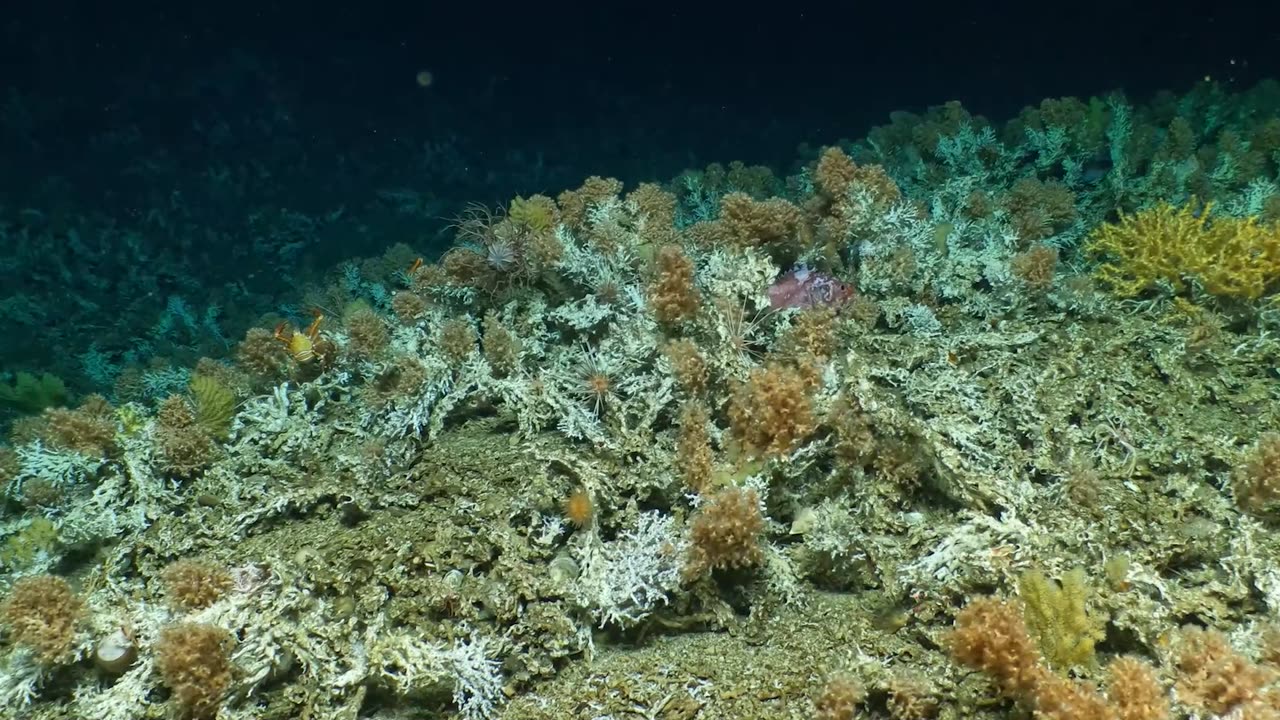Premium Only Content

CORAL RELIEF: Huge Ancient Reef Discovered Off Darwin Islands
Marine scientists have discovered a huge and previously unknown coral reef in perfect condition off the coast of Charles Darwin's Galapagos islands.
Experts in the team from Britain, America and Ecuador believe the reef - sitting on an underwater mountain - could be thousands of years old.
Astonishing video footage of the reef, with a rich flora and fauna, emerged after scientists used a state-of-the-art submersible to explore the site up to 600 metres (2,000 feet) below the sea.
It shows a deep-sea habitat teeming with life, apparently untouched by modern pollution or extreme weather patterns.
The reef - says the research group - was discovered in a marine reserve between Santa Fe and San Cristobal islands.
Oceanographer Stuart Banks - a marine researcher at the Charles Darwin Foundation (CDF) and a member of the team - said: "The coral from which it is built probably has thousands of years of growth."
He added: "The captivating thing about these reefs is that they are ancient, undisturbed for centuries or thousands of years, and essentially pristine, unlike those found in many other parts of the world's oceans.
"In modern expeditions, less than five per cent of the open waters of the Marine Reserve have been explored, so it is possible that there are more reefs like this one."
The reef is said to spread over several kilometres.
Scientists believe it will help better understand the history of the ocean's environment and hold clues to the modern-day climate crisis.
Other footage shows the scientists' research vessel taking part in the Galapagos 2023 expedition on the surface as it lowers a submersible into the Pacific.
Newsflash obtained a statement from the Galapagos National Park on Monday, 17th April, confirming that a "new coral reef was discovered in the depths of the Galapagos".
The statement also said: "A scientific expedition that is exploring the deep waters of the Galapagos Marine Reserve discovered between 400 and 600 meters below sea level, on top of an unmapped seamount, a totally pristine coral reef, whose structure is more than 50 per cent living coral, which is exceptional for these depths.
"Until now, Wellington Reef, off the coast of Darwin, was thought to be the only one to survive the 1982-1983 El Nino event, but the new finding shows that coral communities in protected waters have persisted for centuries in the depths of the Galapagos Marine Reserve, supporting rich, diverse and potentially unique marine populations."
El Nino is a Pacific weather pattern where unusual winds blow warm surface waters east from the equator towards Central and South America.
Jose Antonio Davalos, the Ecuadorian Minister of the Environment, Water and Ecological Transition, said: "This is encouraging news. This reaffirms our conviction to establish new marine protected areas in Ecuador and to continue promoting the creation of a regional one in the Eastern Tropical Pacific.
"The still unexplored richness of the ocean's depths is one more reason to strive to achieve the commitments of the Global Alliance for the Ocean - 30x30, whose objective is that at least 30 per cent of the world's oceans be declared Marine Protected Areas (MPAs) by 2030, allowing sustainable economic activities aligned with conservation.”
And Galapagos park ranger Jenifer Suarez said: "The results of this investigation into the depths of the marine reserve will allow us to have scientific information, essential to take management measures to conserve these ecosystems that support life in the sea."
The scientists used a submersible research ship called Alvin which can reach depths of 10,000 feet.
The Galapagos Deep 2023 scientific expedition is being led by scientists from the Woods Hole Oceanographic Institution, the University of Bristol, Boise State University and the University of Essex, in collaboration with the Directorate of the Galapagos National Park, the Charles Darwin Foundation and the Oceanographic and Antarctic Institute of the Ecuadorian Navy.
The expedition, which began on 27th March and is set to end on 22nd April, is funded by the US National Science Foundation and Britain's Natural Environment Research Council.
-
 8:42
8:42
Freedom Frontline
14 hours agoDurbin’s Trump Smear Video Just HUMILIATED Him in the Senate
9.21K4 -
 10:56
10:56
ariellescarcella
12 hours agoThe Shocking Divide Among College Voters Sparks Worry For America
7.57K6 -
 13:09
13:09
Forrest Galante
10 hours agoWildlife Expert Reacts To Deadly Australian Animal TikToks
53.5K7 -
 12:08
12:08
Zoufry
2 days agoThe Mystery of Gaddafi's Final 24 Hours
14.7K11 -
 18:25
18:25
Liberty Hangout
13 days agoAnti-Ice Demonstrators Love Poop!
52.4K71 -
 9:39
9:39
MattMorseTV
17 hours ago $1.14 earnedVance just DROPPED a BOMBSHELL.
45.8K65 -
 23:47
23:47
GritsGG
1 day agoThe Forgotten Best Sniper Support AR!
19.2K3 -
 1:15:48
1:15:48
The Pascal Show
18 hours ago $0.12 earnedMUGSHOTS RELEASED! Emmanuel Haro's Parents Mugshot Released To The Public
14.8K1 -
 14:45
14:45
BlabberingCollector
22 hours agoKings Cross Station SET LEAKS! | Harry Potter HBO Show Update & News
13.7K1 -
 33:20
33:20
SB Mowing
9 days agoHealth Struggles + Endless Rain = A Yard Out of Control
21.5K19